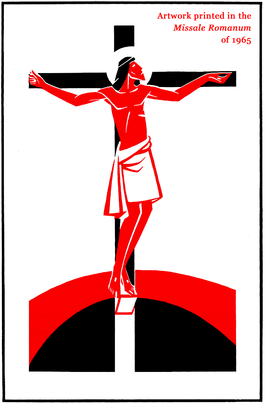
published 15 November 2013 by Jeff Ostrowski

Ugly artwork helps destroy Faith.
 HE CHANGES MADE to the Roman Rite didn’t happen overnight. They were phased in from approximately 1965 to 1972. However, some craziness started pretty early, as you can see by looking at this fully approved “congregational” musical setting of the Our Father published in 1966.
HE CHANGES MADE to the Roman Rite didn’t happen overnight. They were phased in from approximately 1965 to 1972. However, some craziness started pretty early, as you can see by looking at this fully approved “congregational” musical setting of the Our Father published in 1966.The first major changes came when Inter Oecumeniciappeared in 1964. As a result, the 1965 Missale Romanum was published, a radical departure from the 1962 version. Only a few priestly prayers during Offertory and Canon were required to be said in Latin, and even those restrictions would be lifted a couple years later. You can download all 1,780 pages of the 1965 Missal in PDFform:
* * 1965 Missale Romanum: (Part 1) • (Part 2)
THE 1965 MISSAL includes 100% of the Latin (printed in tiny type) right next to the English, becauseInter Oecumenici stated in no uncertain terms:
“Missals to be used in the liturgy, however, shall contain besides the vernacular version the Latin text as well.”
If this principle had been kept, many egregious errors (which still persist 40 years later) could have been avoided. The next big change came on 4 May 1967, when Tres Abhinc Annos allowed the Roman Canon to be prayed in the vernacular. Many priests tore out the (Latin) pages in their 1965 Missals and replaced them with inserts like this one. Notice the Imprimatur dated 1 October 1967. They certainly didn’t waste any time, did they? Why such a big rush to modify a venerable Rite that had existed for 1500 years? The sentence in Tres Abhinc Annos doesn’t match what I’ve been told by many people alive in 1967:
“The rich yield [of the liturgical reforms] is becoming quite clear from the many reports of bishops, which attest to an increased, more aware, and intense participation of the faithful everywhere in the liturgy, especially in the holy sacrifice of the Mass.”
The “rush job” led to many ugly, ephemeral books. In my opinion, the 1965 Missal is difficult to understand in places since it lacks red text, unlike this 1966 Sacramentary (108MB). Numerous errors were also printed, like the following (from the 1965 Missal):

In 1969, Pope Paul VI would promulgate the Novus Ordo Missae, but several more years would elapse before the “complete” Novus Ordo Rite came into existence. The haphazard way in which the various parts (3-year Lectionary, Graduale Simplex, Ordo Cantus Missae, etc.) were introduced can be seen by Bugnini’s explanation.
In 1969, many priests ripped out the Roman Canon and replaced it with inserts like this, containing four (4) new Eucharistic Prayers. Those who look carefully will notice something very odd, which I cannot fully explain:

That’s right … it’s dated December of 1968. My understanding is that Paul VI would not promulgate the new Eucharistic Prayers until 3 April 1969, but perhaps a reader can correct me.
TO QUOTE VANESSA WILLIAMS, I have “saved the best for last.” The most interesting document I’ve found is this 1970 Ordo Missae (89MB). Turn to Appendix I, and you’ll discover many fascinating injunctions. I will not detail them here, but I will provide the following example (based on Liturgicae Instaurationes, §7):

It would be fascinating to learn if books similar to the above were produced in French, Italian, Spanish, German, etc.
UPDATE: Please note that the “Missale Romanum” is dated 1966. However, it’s an identical, exact reprint of the 1965 edition. Also, people have been asking about the “dream come true.” The “dream” was to have the 1965 Missal online.
No comments:
Post a Comment